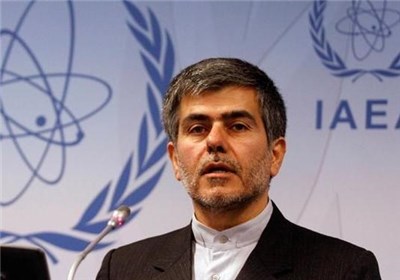 TEHRAN (Tasnim) - Former head of the Atomic Energy Organization of Iran (AEOI) emphasized the necessity for the employment of new generation of centrifuge machines that refine uranium with higher efficiency.
TEHRAN (Tasnim) - Former head of the Atomic Energy Organization of Iran (AEOI) emphasized the necessity for the employment of new generation of centrifuge machines that refine uranium with higher efficiency.Speaking in an exclusive interview with the Tasnim News Agency, former AEOI chief Fereidoun Abbasi, who is also a renowned physicist in Iran, said he sees no reason why Iran should not enjoy the new generation of centrifuge machines.
Iran should use new machines in addition to the old generation of centrifuges since �we are now a powerful country in the field of nuclear technology, have good scientists in designing, calculations and simulation and have also obtained machines with higher separation capability,� he added.
Abbasi said more technical progress in the centrifuge technology will in turn help upgrade other engineering fields in the country, including electricity, control, mechanics, metallurgy, chemistry, machining, welding and production of special alloys.
He noted that Iran�s development in the nuclear science technology will reduce the number of students that go abroad.
The former official also pointed to the West�s insistence on a reduction in the number of Iran�s centrifuge machines, saying they seek to bring Iran�s nuclear technology to a complete halt and stop its research projects.
Abbasi further stressed that Iran should not get engaged in debates over the number of centrifuges.
�We should have the number (of centrifuges) that we deem rational. We should complete our research along with the optimization and also make progress in the technology and production of machines with high SWU (Separative Work Units).�
Back in July 2014, Supreme Leader of the Islamic Revolution Ayatollah Seyed Ali Khamenei underlined that Iran�s uranium enrichment was a vital issue, adding that the country definitely needed an enrichment capacity of 190,000 SWUs.
The Leader had warned that the West's objective in the issue of uranium enrichment is to persuade the Islamic Republic of Iran to limit its enrichment capacity to 10,000 SWUs.
Iran and the Group 5+1 (Russia, China, the US, Britain, France and Germany) are now in nuclear talks with the aim of hammering out a final agreement to end more than a decade of impasse over Tehran�s peaceful nuclear program.
Amid diplomatic negotiations, reports suggest that the sequence and timing of removal of anti-Iran sanctions, Tehran�s uranium enrichment capacity and the number of its centrifuge machines make up the main stumbling blocks to the nuclear talks.
By Tasnim News Agency
The Iran Project is not responsible for the content of quoted articles.










